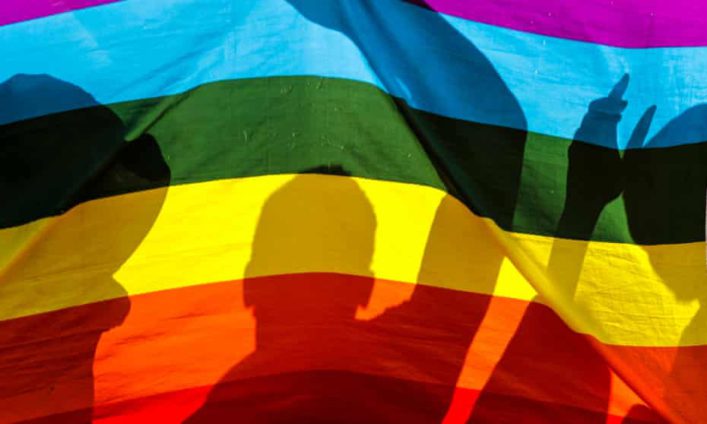Uganda's parliament has passed a bill which would criminalise people who identify as gay, or a sexual minority.
Individuals could face lengthy prison terms if the bill is signed into law by President Yoweri Museveni.
Under the proposed legislation, friends, family and members of the community would have a duty to report individuals in same-sex relationships to the authorities.
Homosexual acts are already illegal in the east African country.
But the bill seeks to go further and criminalise people on the basis of their sexual identity.
The bill, which was first tabled earlier this month, passed with widespread support in Uganda's parliament on Tuesday.
It will now go to President Museveni who can choose to use his veto - and maintain good relations with Western donors and investors - or sign it into law.
The bill also stipulates that a person who is convicted of grooming or trafficking children for purposes of engaging them in homosexual activities faces life in prison.
Individuals or institutions which support or fund LGBT rights' activities or organisations, or publish, broadcast and distribute pro-gay media material and literature, also face prosecution and imprisonment.
A small group of Ugandan MPs on a committee scrutinising the bill disagreed with its premise. They argue the offences it seeks to criminalise are already covered in the country's Penal Code Act.
Activists and LGBT people in Uganda have said that anti-homosexuality sentiment in the country is exposing them to physical and online violence, and that the bill may have far-reaching consequences for Ugandans in general.
In 2014, Uganda's constitutional court nullified a similar act which had toughened laws against the LGBT community.
It included making it illegal to promote and fund LGBT groups and activities, as well as reiterating that homosexual acts should be punished by life imprisonment.
The court ruled that the legislation be revoked because it had been passed by parliament without the required quorum. The law had been widely condemned by Western countries.
Same-sex relations are banned in about 30 African countries, where many people uphold conservative religious and social values.
Latest Stories
-
Mahama likely to assent to E-Levy repeal bill on Wednesday – Deputy Finance Minister
2 hours -
Poland to suspend migrants’ right to apply for asylum
3 hours -
Zelensky hopes US will ‘stand strong’ in face of Russian demands
4 hours -
‘Only injury will stop me from being a part of the national team’ – Antoine Semenyo
4 hours -
UK-Ghana Chamber of Commerce launches the Grand Challenge Programme
4 hours -
E-levy was a massive error committed by Ofori-Atta, it was a bad policy – Dr. Ashigbey
5 hours -
LoveAid Foundation and partners empower women, girls in STEM
5 hours -
Heavy rainstorm caused power outages in parts of Accra – ECG
5 hours -
National Service Authority deploys 13,700 trained teachers for 2025/2026 National Service
5 hours -
Mahama urges CSOs to hold gov’t accountable
5 hours -
Daily Insight for CEOs: Enhancing financial resilience – Strategies for CEOs
5 hours -
Your dreams are too valuable to be sacrificed on drugs – Youth Minister
5 hours -
Thanks for inspiring us – Jordan Ayew pens emotional open letter to Ghanaians
5 hours -
GMet forecasts cloudy skies, thunderstorms on Thursday and Friday
6 hours -
Prof. Bokpin commends gov’t on tax policy reforms
6 hours

